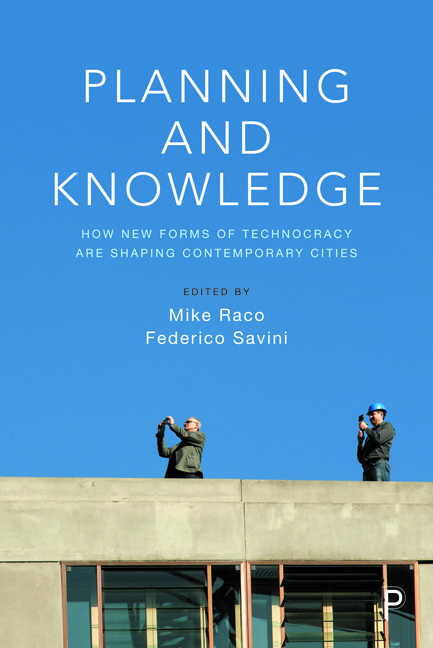Book contents
- Frontmatter
- Contents
- List of figures
- List of tables
- Notes on contributors
- Part I Conceptual framings of technocracy
- Part II Public planning and bureaucracies in contemporary urban development politics
- Part III Corporate knowledge and the land and property development sector
- Part IV Private consultants and the delivery of public policy
- Part V New constellations of actors and the management and governance of contemporary cities
- References
- Index
4 - Plurality of expert knowledge: public planners’experience with urban contractualism inAmsterdam
Published online by Cambridge University Press: 30 April 2022
- Frontmatter
- Contents
- List of figures
- List of tables
- Notes on contributors
- Part I Conceptual framings of technocracy
- Part II Public planning and bureaucracies in contemporary urban development politics
- Part III Corporate knowledge and the land and property development sector
- Part IV Private consultants and the delivery of public policy
- Part V New constellations of actors and the management and governance of contemporary cities
- References
- Index
Summary
Introduction
Focusing on the Dutch planning experience, which istraditionally highly institutionalised andconsensus-oriented, we aim in this chapter tounderstand how planners, as government actors, learnto deal with contracts in complex partnerships withprivate sector actors. We do so in order to questionthe technocratic logics of contemporary public–private partnerships (PPPs) focusing on aninstitutional context where public governments stillretain a major leading role in planning for urbandevelopment but increasingly operate by devisingfinancial agreements with the private sector. To doso, we specifically look at the use of ‘contracts’in urban development. Consensus building in theNetherlands is the key approach in anydecision-making process, implemented through the‘polder model’, which is defined as harmoniouspatterns of interaction between social partners(Glasbergen, 2002; Needham, 2005; Terhorst and Vander Ven, 1998; Van der Valk, 2002). The Dutchexperience demonstrates very clearly that the waysof deal making, and the mechanism of checks andbalances in this process, are very dynamic andreflect the changing dynamics of urban governance.This also means that public planners, veryconsciously, try to reposition themselves tosafeguard the public interest.
Dutch planning has diverse forms of contracting forurban development embedded in the polder model ofpolicy implementation, which is defined asharmonious patterns of interaction and negotiationbetween social partners (Glasbergen, 2002; Needham,2005; Terhorst and Van der Ven, 1998; Van der Valk,2002). Although the overall system isinstitutionalised through top-down regulation, thissystem has been decentralised in recent yearsthrough the development and adoption of new laws andregulations. The decentralisation of planningregulation explicitly aims to decrease bureaucracyin order to ease private sector involvement forlarge-scale projects. Under these conditions, publicplanners in Amsterdam (a central magnet forbusinesses and speculation in the Netherlands) aremore likely to become project contractors given thestress involved in land deals. However, our studyargues that this picture is ambiguous, as plannershave a diversity of positions to deal with in acomplex set of contracts. Moreover, planners workwith certain safeguarding mechanisms based onexperience from the long-standing tradition ofcontracting private sector companies to developprojects on publicly owned land. All theseexperiences, as we display later in the chapter, addto the new plural forms of knowledge which thepublic planner accumulates and uses.
- Type
- Chapter
- Information
- Planning and KnowledgeHow New Forms of Technocracy Are Shaping Contemporary Cities, pp. 47 - 58Publisher: Bristol University PressPrint publication year: 2019

